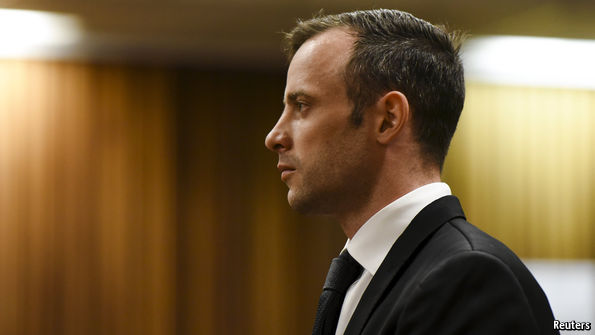
WHEN Oscar Pistorius was convicted of murder last month, the presiding judge described the case as a “human tragedy of Shakespearean proportions”. The Paralympic athlete’s fall from grace had followed a narrative arc that made this comparison appropriate: overcoming severe disability to reach “Olympian heights”, falling in love with a beautiful model, and, in a coincidence that wouldn’t be out of place in one of the bard’s plays, taking her life on Valentine’s Day. Mr Pistorius’s tragic flaw was an excessive paranoia regarding intruders, which manifested itself in an enthusiasm for guns. His downfall will be complete when he is sentenced in April.
Mr Pistorius’s case is, indeed, peculiarly Shakespearean. But Justice Eric Leach, who delivered the judgement, is but one of a vast horde who have turned to the playwright in times of legal need. In 2012, Britain’s High Court evoked “King Lear” in a trial regarding a “menacing” joke on Twitter—they eventually overturned a conviction on the grounds that social-media users “are free to speak not what they ought to say, but what they feel”. A choice snippet of “Hamlet” ("a little patch of ground that hath no profit in it but the name") was recited in a 2008 boundary dispute; a different chunk was used in a French court when discussing criminal liability (“I here proclaim was madness.”). “Henry VIII” (though wrongly attributed at the time as “Henry IV”) was called forth by Senator Sam Ervin Jr during the Watergate hearings. The condemnation of Dzokhar Tsarnaev, one of the orchestrators of the 2013 Boston Marathon bombings, was sealed with lines from “Julius Caesar”: “the evil that men do lives after them; the good is oft interred with their bones.” These examples illuminate and beautify, and make court proceedings user-friendly. (Sometimes it is mere ponderous showing-off: in 1978, Judge Sir Gerald Fitzmaurice felt the need for a footnote explaining that his use of the phrase “a very positive reply” was lifted from act two, scene two, line 43 of “Romeo and Juliet”.)
Lawyers’ love of Shakespeare is appropriate given that more of his lines are devoted to discussing law than any other profession. (Some think his knowledge of the law was so detailed that the “real” Shakespeare must have been a lawyer.) A study by Scott Dodson and Ami Dodson published last year set out to discover “the most literary [Supreme Court] justice” of those currently sitting, and which authors were regularly turned to for quotable wisdom. The “most prolific citer and the widest read” was found to be Antonin Scalia, and—no surprise—William Shakespeare topped the list of the oft-quoted, along with Lewis Carroll. Both Shakespeare and Carroll accrued sixteen references from five justices. Other popular authors among the bench were George Orwell, Charles Dickens, Aldous Huxley and Aesop. (No female writer made the top ten.)
The words of Shakespeare are likely to reverberate around courtrooms for decades to come as many universities—particularly in America and Britain—have incorporated him into their law curriculum. Harvard Law School offers a seminar which focuses entirely on “justice and morality in the plays of Shakespeare”. King’s College London’s “Shakespeare and the Law” module is co-taught by the Literature and Law faculties, and explores “the role of the law in mediating the place of the individual within society”. There are sensible reasons behind this; the University of Southampton, in line with recent studies, states (not implausibly) that it offers the opportunity to study law through a literary prism of Shakespeare, Dickens, Kafka and others in order to “help law students to become more ethically astute practitioners”. A study by David Comer Kidd and Emanuele Castano argues that reading literary fiction makes people show empathy, challenge preconceptions, and be more flexible in their decision-making—all of which are, presumably, desirable in practitioners of the law. A literary sensibility enables lawyers to present clear, structured opinions and briefs.
But what is it about the work of Shakespeare, in particular, that lends itself to legal quotation and reflection? After all, as Robert Peterson pointed out in “The Bard and the Bench”, all 37 of Shakespeare’s plays—including the lesser-known “The Two Noble Kinsmen” and “Timon of Athens”—have been quoted by American courts, in over 800 judicial opinions. One answer lies in Shakespeare’s status as an embodiment of high culture; citing him seeks to invest the judgement with credibility and invoke a sense of history. Mr Peterson notes that this can “[drive] decisions in substantive ways”, pushing courts towards familiar outcomes. Another option is Shakespeare’s universality —everyone has either read, or claims to have read, plays like “Hamlet”. His works have become a shared global parlance; the term “Shakespearean tragedy” evokes a rise-and-fall narrative even if the listener is not intimate with the works themselves. The horrifying details of Mr Pistorius’s actions on that night, contextualised in a familiar Shakespearean frame, helps members of the court, and the public, to make sense of the unnecessary bloodshed. Either way, 400 years after the playwright’s death, Ben Jonson’s assessment is as true as ever: Shakespeare's plays and wisdom are “not of an age, but for all time”.